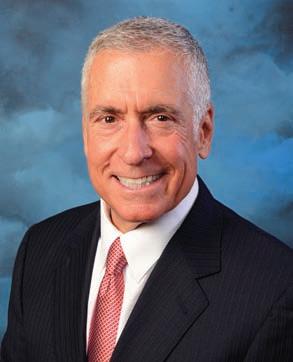
3 minute read
CASINO COMMUNICATIONS A Q & Sal Semola
President and CEO, Gun Lake Casino

Advertisement
Sal Semola has almost 30 years experience in gaming management, with companies such as Greektown Casino in Detroit, Cannery Casinos and Warner Gaming in Las Vegas and several tribal and riverboat casinos. But it wasn’t until Semola was hired at Gun Lake Casino in Wayland, Michigan that he really hit his stride. He was able to advise the owners of the casino, the Match-E-Be-Nash-She-Wish Band of Pottawatomi Indians, how to grow their casino while helping to diversify their economy. The tribe is about the complete phase five, and most spectacular of its expansion project. He spoke with GGB Publisher Roger Gros from his home in Michigan during a winter storm in February.
GGB: It’s been a long time since you took over at Gun Lake, and you’ve been doing such a great job that I don’t think they’ll ever let you go.
Semola: I appreciate that. I’m blessed with great support from leadership and also a good executive team. I’ve been here now approximately five and a half years. And it’s been fun. We’ve done a lot of good things and more to come.
Explain what region of Michigan you’re in. You’re just south of Grand Rapids, correct?
Yes, sir. We are just outside of Grand Rapids located off of Highway 131, which is a major north-south artery for Western Michigan, so it’s highly trafficked, and we’re about equidistant between Grand Rapids, which is the second largest city in the state, and Kalamazoo, Michigan as well.
So I’m mistaken thinking that you’re out in the woods somewhere?
No—our area is somewhat rural. But in the time that I’ve been here, I’ve seen just a ton of growth and development in the area, whether it’s residential or office buildings. Even the Grand Rapids
International Airport is undergoing a major expansion. So there’s a lot of things happening in this area.
Currently you’re completing a $300 million expansion. What are some of the elements of that build-out?
We are calling the expansion phase five. It comprises a 252-room, four-diamond hotel—we don’t have a hotel currently—a spa, additional food and beverage venues, expanded casino space, albeit slightly, and what we refer to as the Aquadome, all designed by HBG Design.
And what was the reason for this expansion? You’ve already had four phases prior to this one. Why did the triad think it was necessary for such a major project?
That’s a great question. And the short answer is we’re playing catch-up. Back in the day when the tribe began this process and partnered with Station at that time, there were a couple of lawsuits that put a little bit of a hamper on what was going to be built. That lawsuit went on for years and ultimately went to the U.S. Supreme Court. The tribe ultimately did prevail, but you had that overhang, and also at the same time as the project was being developed, the financial crisis under way.
So those two things really impacted what was built initially. Like I said, we’re playing catch-up here now. I came on midway through what was characterized as the phase-three expansion, which was rather modest in the sense it was maybe a 100-slot machine addition to the floor. But it was really about a connector building for a parking garage that was needed in anticipation of meeting the needs of future expansions due to the increased traffic, and also the depletion of existing surface parking.
And then phase four, which we just completed in September 2021, comprised three new F&B outlets, and began to set the table for phase five. Once phase five, which is the current expansion, is complete, we will still be smaller than two other successful properties in the area despite Gun Lake Casino, and Grand Rapids in particular, having much more favorable MSAs.
What I hear about the tribal leadership is very impressive—that they’re thinking beyond gaming—and I believe they have a new mixed-use non-gaming development under way. Is this a path for the future for not only Gun Lake, but for progressive tribes?
Yes. I believe you’re spot on. The tribal leadership here is extremely forward-thinking. I think that when you take into account that they’ve only been on their own, so to speak—outside of the umbrella of employing a management company—they’re much further along in that cycle of evolution, in terms of how they look at business and the future.
With that, I believe that tribal gaming enterprises in general as they become more mature over time and realize that there’s economic opportunities that they can comfortably participate in outside of the sovereignty umbrella, they become more comfortable investing in that area. And you’ll see more of that; we’ve already seen it in the commercial gaming front.
As you know, I was part of the Greektown Casino opening, which was the first commercial Native-owned casino in the country. And since then, we’ve had a few more. And I think it’s just the beginning, as they get more comfortable and they meet their more immediate needs. And this is for every tribe.
And some tribes are larger than others, so that may take longer than others, and may be in a worse place to start off with than other tribes, and maybe in a better place. But I think ultimately 10, 15, 20 years from now, there won’t be a tribe that has gaming for at least 10 years under the belt that isn’t seriously considering other economic opportunities.









